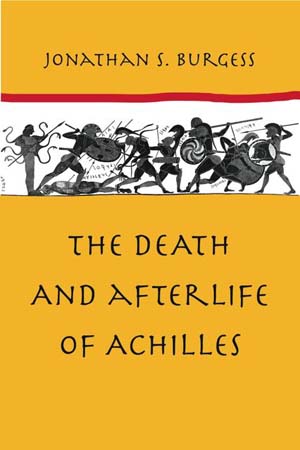
In ancient myth, Achilles is killed by Paris as he tries to invade the gates of Troy. After being buried in a magnificent mound by the sea, his shade enjoys an afterlife at White Island. So go most ancient traditions about the death and afterlife of Achilles, at any rate. But the Iliad and the Odyssey do not directly tell the story of Achilles’ death, and disagree with other sources about his afterlife. So one must move beyond the Homeric poems to get the whole story.
The Death and Afterlife of Achilles tells the mythological story of Achilles by looking at all ancient sources—archaeology, iconography, and the Homeric poems. In ancient myth Achilles meets his most formidable opponent, Memnon, king of the Aethiopians, after the time span of the Iliad. Memnon has arrived with his army to defend Troy, armed with divine armor and supported by a divine mother (Eos, goddess of the dawn), much like Achilles. After an intense duel, Achilles prevails, though Memnon is granted immortality. Soon after, however, Paris kills Achilles.
The book provides an extensive examination of the “Achilles’ heel” motif in antiquity, concluding that the story as we know it, with a dipping of the infant Achilles in the Styx, probably did not exist in early Greek myth. But there is intriguing evidence that a similar story existed, involving the incapacitating of Achilles by a lower wound. The hero was famous for his swiftness, and this initial wound may have been necessary to kill him. Also, in early Greek myth, Achilles was granted immortality at Leuke, “White Island.”
Then the book goes back to the Iliad to see how it reflects, contests, or rejects traditions about Achilles. The death of Patroclus in the Iliad is remarkable just like the mythological death of Achilles, and surely is employed by Homer to foreshadow it. Further foreshadowing is provided by the way that Achilles himself foreshadows his coming death in various ways—like a “dead man walking.” However, there is no foreshadowing of immortality, which is not favored in Homeric epic, and in the Odyssey we find Achilles in Hades. An extended discussion of the afterlife in early Greek myth shows that there was a connected spectrum of afterlife possibilities, from Hades to paradise islands. Homer’s placement of Achilles in Hades is an alternative but not a rejection of earlier traditions. And no one should think that Achilles’ immortality is a “late” invention: Homer is the odd man out, since no other source agrees in the placement of Achilles in Hades. In fact, starting in the Archaic Age, Greeks worshipped Achilles as an immortal hero, and his afterlife island “Leuke” was localized in the Black Sea.
Ancient audiences would have contextualized the Homeric view of Achilles within non-Homeric traditions. They would have come to the Homeric poem with the information I recover, and perceived the full significance of the poem. But modern scholars have lost track of the non-Homeric traditions, thereby missing much of the meaning of the Iliad.
“The tomb associated with Achilles has usually been placed at Cape Sigeion, but recently new evidence has suggested rather a tomb further down the coast. There is no evidence that these tombs contain the remains of a Homeric hero. But they were in existence by the time of the composition of the Iliad, and ancient and modern reactions to them provide us with fascinating glimpses into reception of the Homeric poem and early Greek myth.”
The Death and Afterlife of Achilles looks at all types of ancient evidence about Achilles to reconstruct the basic outlines of his death and afterlife. For literary evidence, the Homeric poems, non-epic poems, lyric poems, later Roman poems, and testimony from late antiquity are employed. From the world of early art, vase paintings and relief pictures are scrutinized. Of particular interest are artifacts that provide multiple episodes in the life of Achilles, providing the “biography” that I try to reconstruct in the book.
This evidence is employed to reconstruct the oral traditions about Achilles that preceded the composition of the Homeric poems, motif by motif. Through intertextual theory, the relationship between the Iliad and these oral traditions is then analyzed. The school of thought in Homeric studies known as Neoanalysis is also used to explore how the Iliad reflects and comments upon traditions that preceded it.
The result is an increased understanding of the artistry of the Homeric poem: it does not directly tell the story of the death of Achilles, but it foreshadows it in meaningful ways. Modern audiences have missed this sense of the Homeric poem’s significance, because they have lost a sense of the pre-Homeric traditions.
From archaeology, the latest evidence from cults sites of worship of the deceased hero, especially in the Black Sea, are provided, as well as the archaeological evidence for burial sites near Troy associated with Achilles. The tomb associated with Achilles has usually been placed at Cape Sigeion, but recently new evidence has suggested rather a tomb further down the coast. There is no evidence that these tombs contain the remains of a Homeric hero. But they were in existence by the time of the composition of the Iliad, and ancient and modern reactions to them provide us with fascinating glimpses into reception of the Homeric poem and early Greek myth.
Browsing readers would enjoy the first chapter of the book, in which the mythological “biography” of the hero is established, especially his childhood, often by relying on the evidence of ancient art. This chapter demonstrates how the childhood of Achilles repeatedly involves the theme of his fated early death of Troy.
Achilles’ divine mother knows his fate, and she repeatedly tries to prevent it, to no avail. There are repeated episodes in the early life of Achilles that involve her efforts to hide her son, or warn him. Most famous is the episode in which Achilles is hidden on a Greek island dressed in the clothes of a girl. The cleverness of Odysseus unmasks the deceit, and Achilles eventually joins the expedition to Troy. But Thetis will continue to try to prevent his death, and she will continue to inform Achilles of his coming fate. In the Iliad we see the concern of Thetis as she advises her son, and Achilles clearly has foreknowledge of his death. The early life of Achilles thus serves as a significant background to the Iliad, and knowledge of the early life of Achilles assists in the comprehension of the relationship of Achilles and Thetis in the Iliad.
“The Achilles’ heel story as we know it, with a dipping of the infant Achilles in the Styx, probably did not exist in early Greek myth.”
The Death and Afterlife of Achilles bestows to the modern reader of Homer what the ancient audience would have possessed: knowledge of the whole story of the hero’s life, death, and afterlife. As a result, new pathways for understanding the Iliad are opened. The book also bestows to the modern audience what the ancient audience did not have: recent archaeological data about cult worship of Achilles and about burial mounds believed to have been associated with him.


Jonathan S. Burgess is a professor of Classics at the University of Toronto. He is the author of The Tradition of the Trojan War in Homer and the Epic Cycle (2001) and several articles on early Greek epic poetry. He is currently a fellow at the Jackman Humanities Institute at the University of Toronto, working on a project about the Odyssey and travel literature.